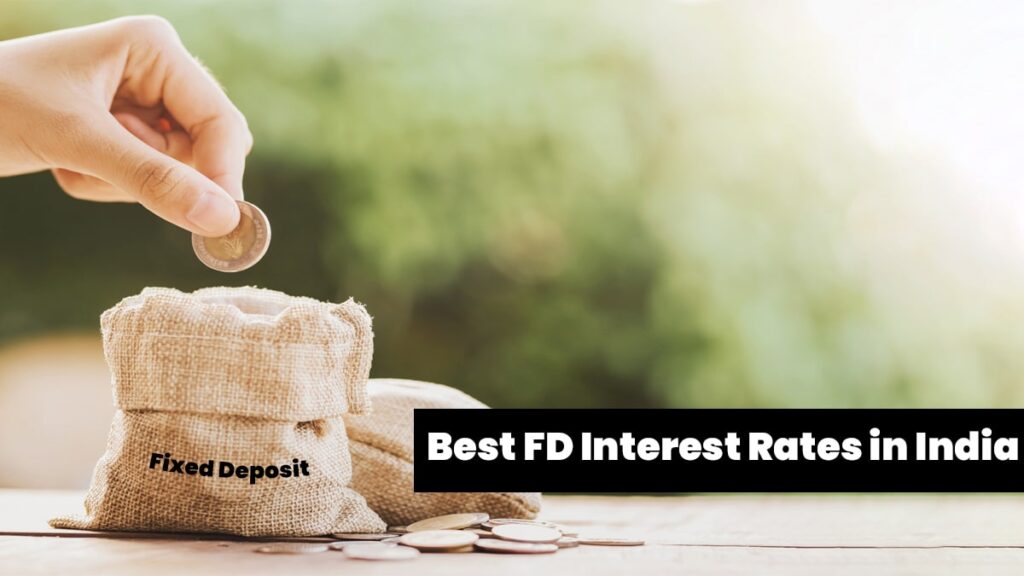One key part of wealth creation is investment, you’ll have to invest to grow your wealth. When the market is down investment is a risky business hence, at that time, you’ll have to keep your wealth afloat by keeping your money safe in an account like Fixed Deposit.
Fixed Deposits are a great way to store your money, it necessarily does not make your investment grow rapidly like another financial tool like the stock market or bonds however, to safeguard money it is the best option.
You might be thinking but, FD offers an attractive rate of interest i.e., more than 7% so why is it not the best investment option to get guaranteed interest?
The answer is Inflation!!
Inflation is the biggest wealth killer and it will make your idle money disappear. Inflation happens when things get costly to buy.
In India, the Inflation rate remains between 3-5%, at max it has reached 6% in the past. Inflation can be best understood with an example.
Let’s say we bought an apple for Rs.10/- and after 5 years the same apple cost us Rs.50/- during these 5 years inflation rate has increased.
An increased inflation rate reduces the purchasing power of the currency and affects the accumulated wealth.
In this article, we will list out the best FD interest rates in India 2024 where you can park your money and protect your wealth against inflation.

Table of Contents
Best FD Interest Rates in India 2024
The following are the FD interest rates in India of various banks and NBFCs-
Public Bank Interest Rates
| Bank Name | Highest slab | 1-year tenure | 3-year tenure | 5-year tenure |
| Bank of Baroda | 7.05 | 6.75 | 6.75 | 6.25 |
| Bank of India | 7.05 | 6 | 6.5 | 6 |
| Bank of Maharashtra | 7 | 6.15 | 6 | 5.75 |
| Canara Bank | 7.15 | 6.75 | 6.5 | 6.5 |
| Central Bank of India | 7.35 | 6.75 | 6 | 6 |
| Indian Bank | 7 | 6.1 | 6.25 | 6.25 |
| Indian Overseas Bank | 7 | 6.4 | 6.5 | 6.5 |
| Punjab & Sind Bank | 7.25 | 6.25 | 6.25 | 6.25 |
| Punjab National Bank | 7.25 | 6.75 | 6.75 | 6.5 |
| State Bank of India | 6.75 | 6.75 | 6.25 | 6.25 |
| UCO Bank | 7.15 | 6.75 | 6.3 | 6.1 |
| Union Bank of India | 7.3 | 6.3 | 7.3 | 6.7 |
Private Bank Interest Rates
| Bank Name | Highest slab | 1-year tenure | 3-year tenure | 5-year tenure |
| Axis Bank | 7.26 | 6.75 | 7 | 7 |
| Bandhan Bank | 8 | 7.25 | 7.25 | 5.85 |
| City Union Bank | 7.75 | 6.75 | 7.25 | 6.9 |
| CSB Bank | 7.5 | 5 | 5.75 | 5.75 |
| DBS Bank | 7.25 | 6.25 | 6.5 | 6.5 |
| DCB Bank | 7.85 | 7.25 | 7.85 | 7.6 |
| Dhanlaxmi Bank | 7.25 | 6.25 | 6 | 6.1 |
| Federal Bank | 7.25 | 6.75 | 6.5 | 6.3 |
| HDFC Bank | 7 | 6.6 | 7 | 7 |
| ICICI Bank | 7 | 6.6 | 7 | 7 |
| IDBI Bank | 7.1 | 6.75 | 6.25 | 6.25 |
| IDFC First Bank | 7.5 | 6.75 | 7.5 | 7 |
| IndusInd Bank | 7.5 | 7 | 7.5 | 7.25 |
| Jammu & Kashmir Bank | 7.25 | 6.75 | 6.5 | 6.5 |
| Karnataka Bank | 7.3 | 6.8 | 5.75 | 5.75 |
| Karur Vysya Bank | 7.25 | 6.5 | 7 | 6.25 |
| Kotak Mahindra Bank | 7 | 6.75 | 6.5 | 6.2 |
| Nainital Bank | 7.05 | 6.6 | 6.25 | 5.75 |
| RBL Bank | 7.8 | 7 | 7 | 7 |
| SBM Bank India | 7.75 | 7.05 | 7.3 | 7.75 |
| South Indian Bank | 7.4 | 6.6 | 6.5 | 6 |
| Tamilnad Mercantile Bank | 7.25 | 6.75 | 6.5 | 6.5 |
| Yes Bank | 7.75 | 7 | 7 | 7 |
NBFC Interest Rates
| Bank Name | Highest slab | 1-year tenure | 3-year tenure | 5-year tenure |
| AU Small Finance Bank | 7.75 | 6.1 | 7.75 | 7.2 |
| Capital Small Finance Bank Limited | 7.5 | 7.1 | 7.1 | 7.1 |
| Equitas Small Finance Bank | 8 | 7.5 | 7.75 | 7 |
| ESAF Small Finance Bank | 8 | 5.5 | 5.75 | 5.25 |
| Fincare Small Finance Bank | 8 | 7.25 | 7 | 7 |
| Jana Small Finance Bank | 8.1 | 7.25 | 8.1 | 7.25 |
| North East Small Finance Bank | 8 | 6.5 | 7.25 | 6.25 |
| Shivalik Small Finance Bank Limited | 8 | 7.5 | 8 | 7 |
| Suryoday Small Finance Bank | 8.51 | 7 | 7.25 | 6.75 |
| Ujjivan Small Finance Bank | 8 | 6.5 | 7.2 | 7.2 |
| Unity Small Finance Bank | 8.5 | 7.35 | 7.65 | 7.65 |
| Utkarsh Small Finance Bank | 8 | 7.5 | 7.5 | 7.5 |
What is a Fixed Deposit Account?
A fixed Deposit or FD Account is an account that offers a higher interest rate than the savings Account for a fixed tenure chosen by the Account holder.
In FD Account, you deposit the funds for a fixed tenure, and at the time of maturity, you receive the amount you have invested plus compound interest.
Highest FD Interest Rate in India
The following are some of the best and highest FD interest rates offered to the customer in India-
| FD Scheme | All Bank FD Interest Rates 2024 |
| IDBI Bank Tax Saving FD | 6.10% – 6.85% |
| PNB Tax Saving FD | 5.80% – 6.30% |
| IDFC First Bank Tax Saving FD | 6.50% |
| Axis Bank Tax Saving FD | 6.10% – 6.85% |
| HDFC Bank Tax Saving FD | 6.10% – 6.60% |
| IndusInd Bank Tax Saver Scheme | 6.75% – 7.50% |
| SBI Bank Tax Saving FD | 6.10% – 6.60% |
| RBL Bank Tax Saving FD | 6.55% – 7.05% |
| Canara Bank Tax Saving FD | 6.50% – |
| Bank of Baroda Tax Saving FD | 5.65% – 6.30% |
| Union Bank of India Tax Saving FD | 6.70% – |
| Punjab and Sind Bank Tax Saving FD | 6.10% – 6.60% |
Benefits of FD Account
The following are the benefits of the Fixed Deposit Account-
- FD Account offers guaranteed fixed returns which are paid back along with the principal amount to the account holder at the time of maturity.
- FD Account protects your wealth from inflation and ensures that your purchasing power does not go down
- It is a risk-free investment as you are speculating on your investment but investing in an FD Account which protects your money.
- Some Bank provides you an option to get a credit card with your FD Account so, a person who does not have a credit history with them can open an FD Account.
- Some FD Accounts can help you save Income tax under the Income Tax Law
How to Open a Fixed Deposit Account?
You can open a Fixed Deposit Account in any bank or NBFC, to open the FD Account you can follow these steps-
- Visit the official website of the bank where you want to deposit your funds and navigate to the Fixed Deposit page of the website
- Now, click on the invest now or start your FD button, you’ll find the button easily
- After clicking on the button, you’ll be redirected to an account opening page where you’ll have to fill out the application form followed by completing the KYC
- Some bank has an online facility of KYC and for some banks, you’ll have to visit the nearest bank branch
- After KYC Completion, you’ll have to deposit your fund in the FD Account by either depositing funds in cash physically or making digital payments from your bank
- After successful payment, your FD Account will be successfully opened
- It is recommended to download the app wherever you are opening the FD Account to ensure that you are tracking the account
FAQ
FD Interest rate in Union Bank of India is different for different tenures. The following are the FD Interest rate in Union Bank of India-
7-14 Days- 3.00
15 -30 Days- 3.00
31-45 Days- 3.00
46 -90 Days- 4.05
91-120 Days- 4.30
121-180 Days- 4.40
181 Days to <1 Year- 5.25
1 Year – 6.30
>1 Year to 598 Days- 6.30*
599 Days- 7.00
600 Days to 699 days- 6.30*
700 days- 7.25*
>700 days to 2 years- 6.30*
> 2 years to 799 days- 6.30*
800 days -7.30*
801 days to less than 3 Years- 6.30*
3 years- 7.30*
>3 Years to 5 Years- 6.70
>5 Years to 10 Years- 6.70
Several banks provide good interest rates for your FD Account investment. Some NBFCs even provide you with 8.5-9% interest for the investment. However, the interest rate of your investment depends on the tenure up to which you want to invest your funds, therefore, whenever you are investing your funds then you should invest your funds for maximum tenure.
Yes, the inflation rate of the country determines the rate at which the purchasing power of that currency is. The higher the inflation rate the costlier the things in that country would be. You need to invest your funds in an account that offers more interest than the inflation rate to beat the invisible wealth eater.
The investment tool that can beat inflation is business share purchases, stock market, inflation-adjusted securities, etc. All these investment options will help you to overcome inflation and still earn profits for the investment.
Yes and No, well Fixed Deposit provides you a fixed interest on the investment that you’ve made and an inflation rate of a country varies in India the inflation rate at the time of economic stress is at max 6-7% in the past 20 years. The inflation interest earned is also 6-7% hence, the FD account is good to store your money and protect it from inflation but not good at making it grow.
I’m Shiv Kumar, a graduate with a passion for finance, marketing, and technology. My journey into finance started with a desire to understand money management and investing.
Our main goal is to empower individuals through financial education. We believe that everyone should have the opportunity to build a strong financial foundation. Whether you’re a seasoned investor or just getting started, we provide articles, guides, and resources to help you navigate the financial landscape.
I invite you to join our community of financially savvy individuals. Feel free to ask questions, engage with our content, and explore the topics that matter to you. Together, let’s take control of our financial futures.




